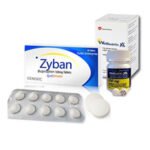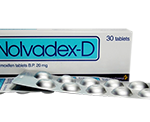What Is Xenical?
Xenical active ingredient
Xenical drug contains as active substance orlistat. Approved indication is the treatment of obesity (BMI> 30 or BMI> 28 and other risk factors). The effect is exerted locally by inhibiting the lipases in the intestine, thereby reducing the degradation of triglycerides and decreasing the absorption of fat. In extensive clinical studies it has been shown that the difference in response rate (weight loss> 10% of body weight) between placebo treatment and orlistat treatment is 12% after one year of treatment. Average weight loss after one year of treatment compared to placebo was 3.2 kg. Stool disorders occur in about 20% of patients during the first year of treatment and about 4% during the second. Treatment with orlistat should not be given for more than two years before further data are available.
Xenical Orlistat is optically active. The choice of synthetic pathway ensures that only one of 16 possible isomers is formed. Furthermore, two different crystal structures of the substance are possible, but only one (the thermodynamically most stable) modification is used in the preparation.
Xenical Dosage
 While individual administration pattern for Xenical may differ from patient to patient and is subject to doctor instructions, the general xenical 120 mg instructions go along the lines of taking a 1 capsule with meals, 3 times a day, spacing them out evenly. To get the best results with the treatment, you should avoid high-fat snacks between meals such as cookies, candy bars, etc.
While individual administration pattern for Xenical may differ from patient to patient and is subject to doctor instructions, the general xenical 120 mg instructions go along the lines of taking a 1 capsule with meals, 3 times a day, spacing them out evenly. To get the best results with the treatment, you should avoid high-fat snacks between meals such as cookies, candy bars, etc.
Xenical only works in the presence of food containing fat. Therefore, you do not need to take Xenical if you missed a meal or if you eat a meal that does not contain any fat.
Tell your doctor if for some reason you have not taken your medication that you have been asked to do. Your doctor may otherwise believe that the drug has not been effective or that you cannot tolerate it and may therefore change your treatment unnecessarily.
How to take Xenical 120mg
Take one Xenical 120mg capsule with each main meal that contains fat, three times daily. Taking more than 360mg of orlistat dosage per day will not provide any additional benefits. Swallow each capsule whole with water either just before, during, or within one hour after your meal.
You should not take the dose when your meal contains no fat or when you completely skip a meal.
Your daily fat consumption should be distributed across breakfast lunch and dinner to minimize digestive side effects while maintaining your prescribed calorie target.
Xenical 120 mg Uses
Xenical 120mg capsules is indicated for the treatment of obese patients with a body mass index (BMI) greater than or equal to 30 kg / m2 or overweight patients (BMI> 28 kg / m2) with concomitant risk factors in combination with a moderately calorie reduced diet.
Treatment with orlistat 120mg capsules should only be initiated if only diet has previously given a weight loss of at least 2.5 kg over a period of 4 consecutive weeks. Treatment with xenical orlistat 120mg should be discontinued after 12 weeks if patients have failed to lose at least 5% of the body weight measured prior to initiating therapy.
Xenical In Weight Loss & Weight Control
 For the treatment of obesity, there have previously been several drugs approved by FDA. Common to these was that they exert their effect in the central nervous system by suppressing appetite. They were deregistered, among other things, because they were central stimulants and often led to abuse. Now a new anti-obesity drug has been approved, orlistat. This agent exerts its effect by inhibiting the lipases in the intestine, thereby reducing the degradation of triglycerides and causing fat malabsorption. The effect is dose-dependent with approximately 23% inhibition of fat absorption at the dose of 120 mg x 3. In clinical trials, fat secretion in the stool was approximately 3 g per 24 hours at the start of treatment and 23 g per 24 hours after one year of treatment with orlistat 120 mg x 3.
For the treatment of obesity, there have previously been several drugs approved by FDA. Common to these was that they exert their effect in the central nervous system by suppressing appetite. They were deregistered, among other things, because they were central stimulants and often led to abuse. Now a new anti-obesity drug has been approved, orlistat. This agent exerts its effect by inhibiting the lipases in the intestine, thereby reducing the degradation of triglycerides and causing fat malabsorption. The effect is dose-dependent with approximately 23% inhibition of fat absorption at the dose of 120 mg x 3. In clinical trials, fat secretion in the stool was approximately 3 g per 24 hours at the start of treatment and 23 g per 24 hours after one year of treatment with orlistat 120 mg x 3.
The effect of orlistat has been studied in four dose titration studies involving 1,421 patients treated at doses of 10-240 mg x 3 for 2-6 months.
The documentation included seven long-term studies with a placebo run-in period of 1-6 months, after which the patients were treated with placebo or orlistat 30-120 mg x 3. A total of 4,188 patients were treated for 1-2 years. These phase III studies were double-blind and randomized parallel group studies. Apart from a study where the run-in period was six months, the studies were conducted according to the same protocol.
The primary measure of effectiveness was body weight change (weight loss after one year of treatment and prevention of weight gain after two years of treatment). Secondary efficacy measures were related to risk factors in obesity: cholesterol, LDL, HDL, VLDL cholesterol and triglycerides, lipoprotein A, apolipoprotein A1 and B, blood pressure, insulin and glucose and anthropometric measures such as waist size and quality of life.
Xenical vs. Orlistat
Generic xenical orlistat, is also available in its 120 mg form. It is commonly known that when the patent for exclusive manufacturing rights owned by the developer of the drug production expires and other pharmaceutical companies can pick up production, the drug price drops. One of the most commonly alluded to disadvantages of Xenical happens to be exactly that: its prohibitive cost. Logically then, with none of the high cost entailed, generic Xenical (Orlistat) easily becomes a next to perfect solution for weight loss.
Generic version of the drug is produced according to the same high manufacturing standards imposed by authorities in healthcare and pharmacology internationally. The composition, mechanism of action, method of administration and safety are identical for both brand and generic drug forms. The only differences are, understandably, the name – generic Xenical is produced under its generic name Orlistat, and some excipients. Excipients are auxiliary substances used to give the drug its form and color. Let’s compare the excipients in generic and brand Xenical:
Generic Orlistat
Capsule content: Microcrystalline cellulose, sodium starch glycolate (type A), colloidal anhydrous silica, sodium lauryl sulfate.
Capsule shell: gelatin, titanium dioxide (E171), indigo carmine (E132).
Brand Xenical
Microcrystalline cellulose (E460), sodium starch glycolate (type A), povidone (E1201), sodium lauril sulfate and talc. The capsule shell includes gelatin, indigo carmine (E132), titanium dioxide (E171) and ink.
Xenical 120 mg side effects
Possible undesirable effects related to the pharmacological effect studied were: decreased systemic absorption of lipophilic substances, eg fat-soluble vitamins, alteration of calcium and bone metabolism, increased fecal fat secretion, and laboratory tests on organ function.
Orlistat 120 mg side effects are: steatorrhea, that is to say, fatty and loose stools, because orlistat blocks the absorption of some of the dietary fat.
- Fecal incontinence;
- Uncontrollable diarrhea: frequent or urgent stools;
- Flatulence and associated colics;
- In individuals with type 2 diabetes, drop in blood sugar levels;
- Some patients may develop high levels of oxalates in the urine;
Orlistat can cause liver damage. Serious hepatitis, however, remains exceptional and it is possible that these accidents are related to factors other than the use of this drug.
The main adverse effects of Xenical are related to the presence of lipids in the diet. Pharmacists trained to this prescription by laboratories advice, therefore, to reduce fat in the diet during treatment, which in itself is a diet that allows a weight reduction.
According to Roche, xenical 120 side effects are more severe at the beginning of therapy and decrease over time16. This approach is supported by the results of the XENDOS study, which found that only 36% of people have undesirable gastrointestinal effects in their fourth year of Xenicnal use, while 91% of people with the study had at least one undesirable gastrointestinal effect during the first year of treatment. This reduction in side effects could be associated with a change in a diet lowering fatty foods.
Posted in Weight Loss
(1 voices, average: 5 of 5) 9936 views























